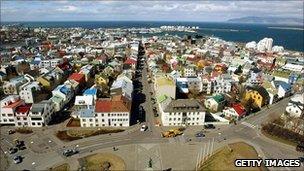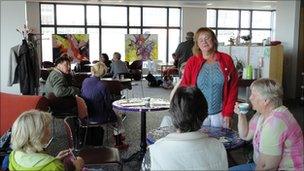Unemployment shock hits Iceland
- Published

The number of unemployed people in Iceland has risen by 14,000 in a year
Iceland's government has been battling an economic crisis for months but now it has to deal with a major social problem - rapidly rising unemployment.
The number of people out of work has increased dramatically since the financial crash which wiped out the northern nation's banks - and with it the country's economy.
Little more than a year ago there were just 2,000 people unemployed in the sparsely populated country. Now there are 16,000.
At the age of 58, civil engineer Armann Johannesson lost his job for the first time.
"It's a very, very bad time. All the time I had a pain in the stomach and I was confused in the head.
"The government and the unions don't know how to work on this matter."
Armann's story is now very common here. Unemployment has never previously been an issue in Iceland. In recent years it has averaged just 1%. That figure is now eight times higher.
The country's Minister for Social Affairs, Arni Pall Arnason, is clear when asked whether it is true his country was not prepared for helping so many unemployed people.
"The short answer to that is no, we weren't.
"The labour agency was flooded with applications to begin with, and just processing the applications and making sure that everyone was paid benefits was job enough in the beginning."
Mr Arnason says he has had to travel far and wide to learn how unemployment and back-to-work schemes are run, in the hope of easing Iceland's difficulties.
Psychological support
Such was the need for support for the unemployed that the charity sector had to step in.

Drop-in centres have been provided to support the growing number of unemployed people in Iceland
The Red Cross has set up a drop-in centre in an office suite in the financial district of Reykjavik
Spokeswoman Solveig Olafsdottir says the centre gives more than tea and sympathy.
It offers proper clinical counselling to those emotionally damaged by the experience of redundancy.
"Since providing psycho-social support is part of our recognised role in emergency situations, we decided to look at this as an emergency situation, so this centre was actually set up as a psycho-social support centre for people to come in here and to get counselling."
Armann Johannesson both uses and praises the service.
"[Redundancy] has depressed us. People here understand how you feel without looking at you with pity. On the streets you walk around trying not to look people in the eyes, but not in the centre."
Bjorg Olafsdottir has been using the support service since losing her job in the design industry.
She explains how Iceland's people have been suffering.
"The financial crisis hit us the worst and it's the people of Iceland it has hurt. People have lost their houses, our healthcare system is going down, our education system is going down, everything."
Icesave repayments
As Iceland struggles to get back on its feet, people here are all too aware they still have a debt to pay to the UK and the Netherlands, whose governments bailed out British and Dutch savers who had lost money in Icesave bank accounts.
The bill is said to equate to £10,000 for every Icelandic taxpayer.
Bjorg Olafsdottir is appalled. "It would be like cutting off our arms and legs, it's just not possible."
Iceland's bid to join the EU could hit the rocks over Icesave if Reykjavik fails to come up with a repayment plan.

Armann Johannesson is forced to leave Iceland to look for work
But Social Affairs Minister Arnason also fears the domestic implications of giving the money back.
"It will definitely hit ordinary people, and it will definitely hit our ability to come out of this intact.
Undoubtedly it will reduce our ability to maintain the welfare state and the welfare provisions that we will want of course for our citizens."
However, he suggests that economic recovery is on the way - something which could ease the situation.
"All the indications we see now are that we are close to the bottom of the recession if not on the bottom.
We have seen some growth in the last two quarters. So it's our hope that we have seen the worst of this crisis."
Job search
But for Mr Johannesson any recovery will come too late. After more than a year out of work, he has been offered a job.
But there is a catch. He must emigrate, and leave behind his family and friends.
"I have got a job in Norway starting on the first of October.
"My wife will come with me, but my other family and friends will be left behind. I will probably have to stay away until I am old enough to retire."
That will be more than a decade away, when Armann turns 70.
Such is the new harsh reality for Iceland's labour market.
- Published28 July 2010